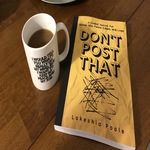
These days, social media is the primary way many people communicate and commune, but at what cost? According to Pew Institute, 64 percent of Americans say social media has a mostly negative effect on the way things are going in the U.S. today. Despite being connected with hundreds of “friends,” many feel isolated and anxious thanks to social media usage. With her new guided journal, Author and Communications Consultant Lakeshia Poole hopes to help people navigate the online space without all the headaches and heartbreak.
Don’t Post That: A Guided Journal encourages people to pour out their frustrations on the page instead of social media. Blending hope with humor, Poole helps readers get stuff off their hearts and minds in a space that allows them to process their thoughts and feelings privately before posting publicly.
“It’s so easy to get caught up in online debates and arguments and say something that you regret later. Particularly in this political climate, people are spreading a lot of misinformation and saying things that ruin friendships and reputations,” said Poole. “A lot of times, we’re seeing an outward expression of something that’s happening on the inside. So, when I say ‘Don’t Post That’ what I’m really saying is, let’s think about this first. Is this something you’ll regret later? Is there a better way to say this? What do you hope to achieve by posting that?”
What began as personal practice inspired Poole’s unique publication. Included in the guided journal are over 150+ serious and silly introspective prompts, principles to encourage peace and blank pages for whatever needs to be let out quick, fast and in a hurry.
As a communications professional, Poole understands the power of word choice and how integral social media has become to daily life. Over the past 15 years, she’s helped executives, global corporations and small businesses establish a positive digital footprint. However, she’s also seen everyday people fall into the pitfalls of the social media space.
“I’ve conducted a lot of social media audits for companies and I’m always shocked at how much people publicly complain about their jobs. We’ve all seen instances where people are fired for things they’ve posted online, and yet people still continue to act recklessly,” she said. “I think people are seeking an outlet to express themselves and social media is a quick and easy way to say what you want, but it’s not always the most effective route.”
In Don’t Post That, Poole illustrates how journaling can serve as a safer, more positive way to process emotions, feelings and traumatic experiences. It can also help strengthen communications skills, helping users think and speak clearer.
Several studies have shown the benefits of journaling, also known as expressive writing. Positive Psychology noted reduced anxiety, improved trauma recovery, a boost in long-term wellbeing, and improved working memory as just a few of those benefits.
“Social media isn’t all bad. It’s a wonderful way to socialize, connect and share about things and causes that are important to us,” Poole added. “In my experience, by journaling those initial thoughts, we can better communicate publicly what we really want, need, and think and actually get it.”
For more information about Don’t Post That, visit DontPostThatJournal.com.



